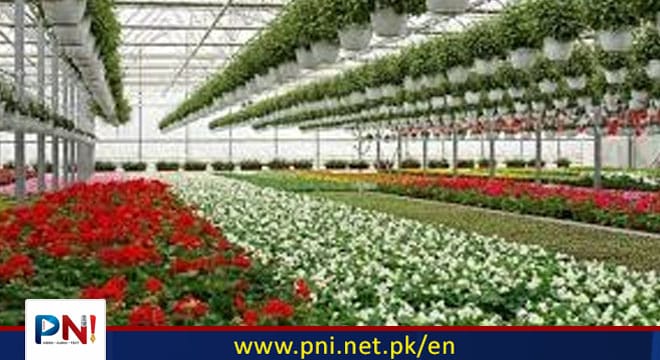BEIJING, July 27 (APP): Pakistan is a country of small farming households with a long history and rich experience in floriculture. There is a huge potential for cooperation between China and Pakistan in the flower industry, said Naeem Iqbal Cheema, Political Counsellor at the Embassy of Pakistan in China.
Pakistan’s floriculture exports could also be enhanced by targeting global markets through the Belt and Road Initiative (BRI),he added.
Â
Floriculture is a high-profit industry. In recent years, multiple related programmes started in Pakistan to encourage farmers to plant flowers. Hashopee Garden in Gilgit-Baltistan is one of the examples.
“We want to show people that flowers are not only used for beauty, for weddings and funerals, but also an important economic crop. Farmers can get maximum income from a small area through floricultural crop production,” said GM
Saqib, deputy director of the Department of Agriculture, Shigar, Gilgit-Baltistan. Now, the new cash crop, flower, is
gaining popularity among local farmers.
“Here you will find more than 80 flower varieties in Hashopee Garden. It is a very profitable business that we should bring people to. For instance, one kanal of land can produce 10,000 sticks of lily flower, and one stick can sell for 400 rupees in the market of Karachi. The lily bulbs left in the ground after cutting is also a separate asset with separate value. This is dual income.” Saqib said, emphasizing the high profit of the flower industry.
“Two important climatic factors are required for flower bulb production. One is the large difference in temperature between day and night. The other is the dry weather with low rainfall. These conditions are very suitable in Gilgit-Baltistan and many other places in Pakistan, he added. To boost the potential of Pakistan’s floriculture industry, further efforts in technology improvement and industrialization need to be done.
As Pakistan has very good ties with China, which is now the world’s largest flower producer as well as an important participant in the foreign trade of flowers, China can be a potential partner that Pakistan can cooperate with and has great floricultural experience that Pakistan can refer to.
Pingyin county of Shandong, China is now home to a rose planting area of about 4,000 hectares and more than 40 rose processing enterprises. “Almost every household in our village grows roses because the soil and climate here are suitable for it,” said Yao, a 70-year-old local farmer who grows one mu (0.067 hectares) of roses, adding that the flower industry not only makes his village very beautiful in April and May but brings good incomes to the villagers.
To help farmers grow roses more easily and earn more, the county government also built a big data platform to provide them with growing data such as weather and marketing. A lot of companies and processing plants were established in the town, so that farmers can sell their flowers easily. Products made with roses in the county range from food and cosmetics to medicine, and have been sold to more than 10 countries and regions.
Aside from experience reference, Pak-China cooperation in the flower industry can also help Pakistan expand its sale channels. Currently in Pakistan, fresh flowers are normally used for ceremonial and decorative purposes, while dried petals and potted plants are mainly exported to Gulf countries.
As one of the biggest flower consumers in the world, China’s flower imports have been growing rapidly in recent years. “Contract farming with Chinese stakeholders for production of dried flower buds and petals for export to Chinese markets is a feasible avenue. The presentation of value-added products such as flower essential oil, flower jam and cosmetics will further expand the visibility of Pakistani flowers among Chinese customers,” suggested Prof. Dr. Iqrar Ahmad Khan, Vice Chancellor of University of Agriculture, Faisalabad (UAF).
Earlier this year, the BRI Rose Industry Consortium was officially established to promote bilateral and multilateral trade and personnel exchanges among the BRI countries.
 Productive clusters of Pakistani roses have also been established along the Belt and Road to bring additional gross revenues. In the future, such floriculture cooperation will be extended to more flower varieties.
Follow the PNI Facebook page for the latest news and updates.









